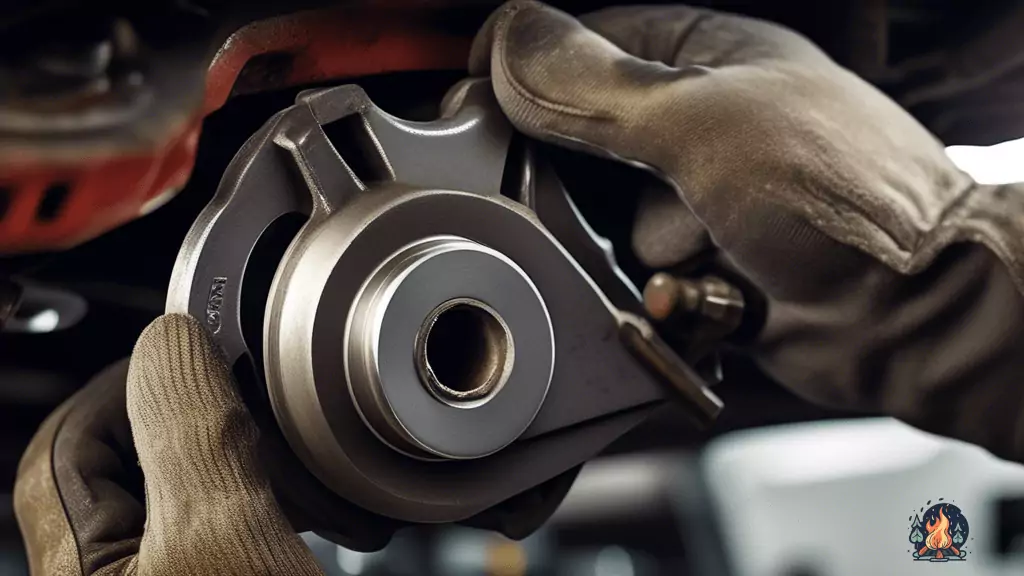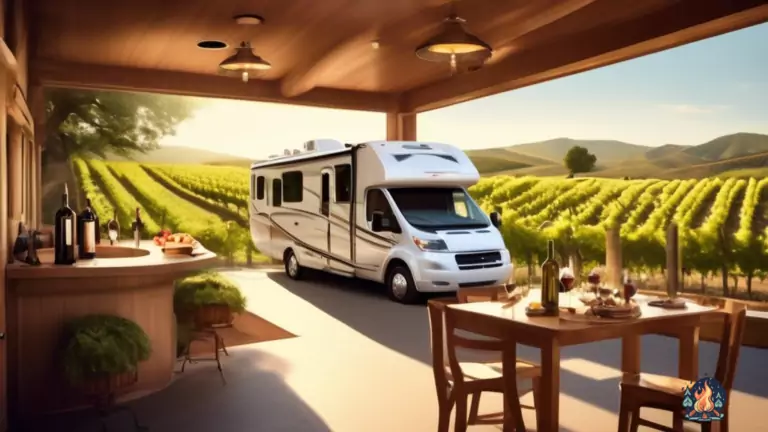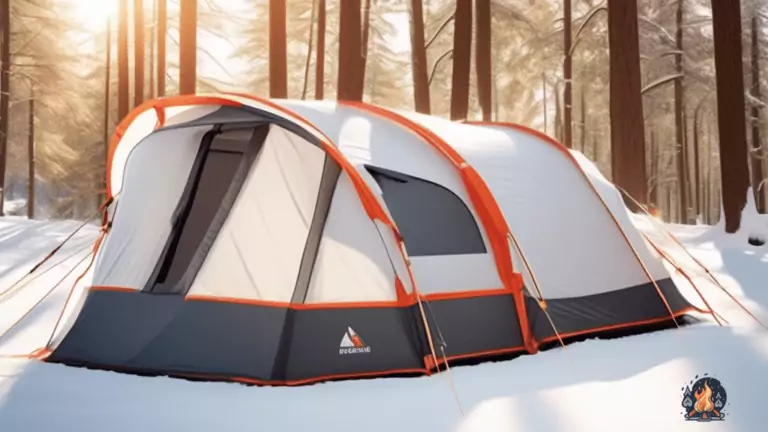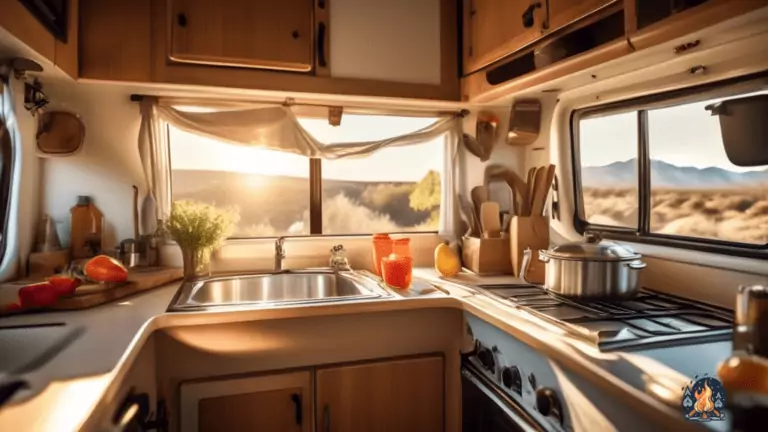Maintaining Your RV Brakes: Tips And Tricks
by Kevin Fairbanks • Updated: January 21, 2024
Looking to maintain your RV brakes? Learn valuable tips and tricks for top-notch RV brake maintenance. Don’t let anything hold you back from your next adventure – click here to keep your brakes in tip-top shape!

In the world of RV travel, your brakes are like the unsung heroes – quietly working behind the scenes to keep you safe on the road.
They may not get the attention they deserve, but maintaining your RV brakes is essential for a smooth and worry-free journey.
So, grab your toolbox and get ready to dive into the world of brake maintenance, because in this article, we’ll be sharing some tips and tricks to help you keep your brakes in top-notch condition.
Picture this: you’re cruising down the highway, wind in your hair, and a smile on your face as you embark on your next adventure.
Suddenly, you need to come to a screeching halt and avoid an unexpected obstacle.
Without well-maintained brakes, this scenario could quickly turn into a disaster.
That’s why it’s crucial to understand the basics of RV brakes and how to keep them in tip-top shape.
From regular inspections and maintenance to recognizing signs of wear and knowing when it’s time for a replacement, we’ve got you covered.
So, let’s dive in and ensure your brakes are ready to take on whatever the road throws your way!
Key Takeaways
- Regular maintenance and inspections are necessary for the optimal performance of RV brakes.
- Signs of brake wear, such as squealing brakes and shaking steering wheel, should not be ignored and should be addressed promptly.
- Proper brake adjustment and calibration are essential for even distribution of braking force and optimal performance.
- Following tips such as avoiding excessive speeding, heavy loads, riding the brakes, and getting regular check-ups can help extend the lifespan of RV brakes and ensure a safer journey.
Understanding the Basics of RV Brakes
Now that you have a grasp on the ins and outs of RV brakes, let’s dive deeper into understanding the basics and how to keep them in tip-top shape.
So, you’re probably wondering, what exactly are RV brakes? Well, my friend, they’re like the superheroes of your RV, keeping you safe and stopping you from crashing into things. It’s like having a team of Avengers right there on your wheels. But just like superheroes, they need a little maintenance to stay in their prime.
Let’s start with the basics. RV brakes work on the simple principle of friction. When you step on the brake pedal, it activates a hydraulic system that squeezes the brake pads against the brake rotors, creating the friction needed to slow down or stop your RV. It’s like two best friends giving each other a big squeeze, except in this case, it’s for safety reasons and not just a friendly hug.
To keep your RV brakes in tip-top shape, you need to make sure they’re properly adjusted and maintained. Check the brake fluid regularly to ensure it’s at the right level. If it’s low, top it up and give your RV a pat on the back for a job well done.
Also, keep an eye out for any leaks or worn-out brake pads. If you notice anything fishy, get it fixed right away before it turns into a full-blown disaster. Remember, you want your brakes to be like a well-oiled machine, not a rusty old bicycle.
So, my friend, take care of those brakes, and they’ll take care of you on your RV adventures.
Regular Inspections and Maintenance
Regular inspections and maintenance are essential for keeping your RV’s braking system in optimal condition. Just like you wouldn’t want to go on a road trip without checking for gas in your tank (unless you’re into that kind of adventure), you shouldn’t neglect the well-being of your brakes.
It’s not like they’ll throw a party if you do, but they might throw a tantrum during an emergency stop. Trust me, you don’t want to be caught in that situation. So, make it a habit to give your brakes a once-over every now and then.
Start by inspecting the brake pads. These little guys are the heroes that make your RV stop when you need it to. If they’re worn out or damaged, it’s time for a replacement. And don’t forget about the brake fluid!
Like a good moisturizer for your skin, brake fluid keeps your brakes lubricated and functioning smoothly. So, check the fluid level and make sure it’s in that sweet spot between "I can stop on a dime" and "Oops, my brakes are failing."
Regular inspections and maintenance may not be the most exciting thing to do, but they’re like the responsible friend who keeps you out of trouble. So, grab your toolbox and get ready to give your brakes some well-deserved TLC.
Signs of Brake Wear and When to Replace
When you notice any of these signs, it’s time to consider replacing your RV brakes. Trust me, you don’t want to be cruising down the highway and suddenly realize your brakes are about as effective as a rubber band.
So, keep an eye out for these red flags:
- Squealing brakes: If your brakes start making a noise like a piglet caught in a bear trap, it’s a clear sign that something is not right. Don’t ignore it, unless you enjoy the attention you’ll get from fellow drivers who think there’s a banshee on the loose.
- Shaking steering wheel: If your steering wheel resembles a maraca during braking, it’s a good indication that your brake rotors are warped. It’s like trying to drive a carnival ride down the road. Fun for a minute, but not so great for stopping power.
- Longer stopping distances: If it feels like your RV is auditioning for the next Fast and Furious movie with its super long stopping distances, it’s time to slam on the brakes (figuratively, of course). Your brake pads might be worn out, and they’re not exactly the type to grow back like a lizard’s tail.
So, my friend, if you notice any of these signs, don’t be like a squirrel crossing the road without looking both ways. Replace those brakes and keep your RV and your passengers safe. Trust me, it’s better to be the hero of the road than the punchline of a bad joke.
Proper Brake Adjustment and Calibration
Properly adjusting and calibrating your RV brakes ensures optimal performance and peace of mind while on the road. You don’t want to be cruising down the highway, only to realize that your brakes aren’t responding as they should. So, let’s dive into the world of brake adjustment and calibration.
First, let’s talk about brake adjustment. It’s important to ensure that your brakes are properly adjusted to provide the right amount of stopping power. If your brakes are too loose, they may not engage fully when you apply the pedal, resulting in longer stopping distances. On the other hand, if your brakes are too tight, they may drag and cause unnecessary wear on the brake pads and rotors. To help you understand the importance of brake adjustment, here’s a handy table:
| Brake Adjustment | Effect |
|---|---|
| Too Loose | Longer stopping distances |
| Too Tight | Brake drag and excessive wear |
Now, let’s move on to brake calibration. Brake calibration involves making sure that the braking force is distributed evenly between all of your RV’s wheels. This is crucial for maintaining stability and preventing uneven tire wear. If your brakes are not properly calibrated, you may experience a pulling sensation while braking, which can be both annoying and unsafe. To give you a better idea of the impact of brake calibration, here’s another table:
| Brake Calibration | Effect |
|---|---|
| Uneven | Pulling sensation while braking |
| Even | Stable braking and even tire wear |
By taking the time to adjust and calibrate your RV brakes, you can ensure that they are working at their best. This not only improves your safety on the road but also prevents unnecessary wear and tear on your braking system. So, grab your tools and get ready to give your RV brakes the attention they deserve. Trust me, your brakes will thank you, and you’ll have peace of mind knowing that you can stop safely and effectively whenever you need to.
Tips for Extending the Lifespan of Your RV Brakes
To maximize the lifespan of your RV brakes, it’s important to follow a few key strategies. Here are some tips that will help you keep your brakes in top shape for longer:
- Don’t be a speed demon: We get it, the open road is calling your name and you want to feel the wind in your hair. But remember, excessive speeding can put unnecessary strain on your brakes. So, take it easy and enjoy the journey at a reasonable speed. Your brakes will thank you later.
- Give ’em a break: No, we don’t mean a coffee break for your brakes (although that would be nice). We mean giving them a break from heavy loads. Overloading your RV can put a lot of stress on the brakes and cause them to wear out faster. So, be mindful of the weight you’re carrying and try to distribute it evenly to lighten the load on those poor brakes.
- Don’t ride the brakes: We know it’s tempting to keep your foot on the brake pedal while going downhill, but it’s not the best idea for the longevity of your brakes. Constantly riding the brakes can cause them to overheat and wear out faster. Instead, try using engine braking or downshifting to control your speed. It’s not only better for your brakes, but it can also give you a sense of control and make you feel like a race car driver (minus the actual racing, of course).
- Get a regular check-up: Just like you go to the doctor for a check-up, your brakes need regular maintenance too. Make sure to have your brakes inspected and serviced by a professional at least once a year. They can catch any potential issues before they become big problems and keep your brakes in tip-top shape.
By following these tips, you can extend the lifespan of your RV brakes and have a smoother and safer journey. So, go out there and enjoy the open road, all while keeping those brakes happy and healthy.
Frequently Asked Questions
How often should I have my RV brakes inspected and maintained?
You should have your RV brakes inspected and maintained at least once a year. It’s like giving your brakes a spa day! Don’t wait until they’re squealing like a pig, keep them in tip-top shape for a smooth and safe ride.
Are there any specific signs or symptoms I should look out for that indicate my RV brakes may need to be replaced?
If your RV brakes are squeaking like a mouse on a roller coaster or if you feel a pulsating sensation when you press the pedal, it’s time to say goodbye to those worn-out brakes.
Can I perform the brake adjustment and calibration on my RV myself, or should I take it to a professional?
You can definitely perform the brake adjustment and calibration on your RV yourself! Just make sure you have the right tools and a handy guide. Plus, who doesn’t love a little DIY adventure? Happy braking!
Is there a recommended lifespan for RV brakes, and if so, how can I extend it?
Did you know that the average lifespan of RV brakes is around 50,000 miles? But fear not, my friend! By regularly maintaining and properly adjusting your brakes, you can extend their life and keep your RV rolling smoothly for even longer. So get those brake pads checked and hit the road with confidence!
Are there any special considerations or techniques for maintaining RV brakes during long periods of storage or non-use?
When storing your RV for long periods, remember to give your brakes some TLC. Clean them to prevent corrosion, apply a thin layer of lubricant, and cover them to keep dirt and critters out. Your brakes will be ready for action when you are!

Hi, I’m Kevin, a lifelong camping enthusiast and the voice behind Campfire Discoveries. From tent to RV to cabin camping, I’ve explored it all. Join me as we share stories and tips around the campfire, deepening our connection with the great outdoors.
Keep Reading
-
Wine Lover’s Paradise: RV Camping Near Wineries
Looking for the perfect getaway? Experience RV camping near wineries and indulge in tastings, breathtaking views, and unforgettable adventures. Plan your wine lover’s paradise today!
-
4-Season Tent Features: The Ultimate Guide
Get ready for any adventure with our ultimate guide to 4-Season Tent Features. Discover the must-have durability and insulation that will keep you comfortable in any weather. Click here to ensure you’re prepared for your next outdoor escapade!
-
Essential Tools And Equipment For Your RV Camping Kitchen
Upgrade Your Outdoor Cooking Game with These Must-Have Camping Kitchen Essentials! Don’t Miss Out on the Best Tools and Equipment for Your RV Adventure. Click Here Now to Discover More!



